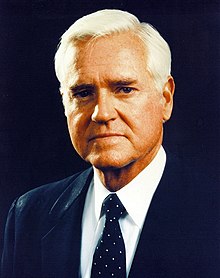Fritz Hollings
Ernest Frederick "Fritz" Hollings (born January 1, 1922 in Charleston , South Carolina ; † April 6, 2019 in Isle of Palms , Charleston County , South Carolina) was an American politician. He was a member of the Democratic Party and was Governor of South Carolina from 1959 to 1963 and a member of the United States Senate from 1966 to 2005 .
Early years and political advancement
Fritz Hollings attended the Citadel Military Academy in Charleston, South Carolina until 1942 . During the Second World War he served in the US Army, where he made it to the position of captain . After the war, he studied law at the University of South Carolina and was admitted to the bar in 1947. From 1948 to 1954 Hollings was a member of the state parliament of South Carolina . Since 1950 he was its president as speaker. From 1955 to 1959 he was under Governor George Bell Timmerman his lieutenant governor .
Governor of south carolina
For the upcoming gubernatorial elections in 1958, he was nominated by his Democratic Party as the top candidate and was elected on November 4th with no opponents. During his four-year term of office until January 15, 1963, he represented a fundamentally conservative, segregationist policy. To commemorate the 100th anniversary of the withdrawal of South Carolina from the Union, he hoisted the Confederation flag on the Capitol in Columbia . Back then there were repeated marches and demonstrations in the context of the civil rights movement in South Carolina . The governor and the then conservative Democratic Party resisted and forbade interference from outside, especially the federal government. The racial conflict in South Carolina, as in most of the southern states, escalated dramatically. Despite his fundamentally negative attitude, Hollings showed himself willing to compromise and finally supported the abolition of racial segregation in public schools and universities. Unlike many other states, South Carolina did not experience widespread outbreaks of violence in the 1960s.
The last executions took place for a long time during Hollings' tenure. He was also a member of a federal committee responsible for state relations and he was an advisor to regional nuclear power producers.
Membership in the US Senate and further life
Since the constitution forbade direct re-election, Hollings resigned from office on January 15, 1963. He served as a lawyer for a short time before being elected to the US Senate in 1966, where he remained until January 2005. Among other things, he was chairman of the Committee on Trade, Research and Transport and various other committees, such as the Budget Committee. In 1984 he unsuccessfully applied for the Democratic nomination for president. During his time in the Senate, he was considered moderately conservative and was re-elected five times with a clear majority. Hollings was particularly committed to strong defense - the US armed forces were a major employer in South Carolina - and was a staunch advocate of a balanced state budget .
After Hollings' death, House Chairwoman Nancy Pelosi recognized him as "a Senate giant, a hero from South Carolina and a beloved, courageous, convincing statesman." Former Vice President Joe Biden called Hollings his "friend and soulmate" who has always supported him politically and personally in his life.
Web links
- Governor Ernest Frederick Hollings. In: National Governors Association . Archived from the original on May 3, 2018 .
- Kerri Fitts, Robin Welch: SC Governors - Ernest Frederick Hollings, 1959–1963. In: SCIway.net / South Carolina Information Highway. (English).
- Hollings, Ernest Frederick (Fritz), (1922-). In: Biographical Directory of the United States Congress. (English).
Individual evidence
- ^ Brian Hicks, Schuyler Kropf, Andy Shain: Former SC Governor, US Senator Ernest F. 'Fritz' Hollings dies at 97. In: The Post and Courier. April 6, 2019, accessed April 8, 2019 .
- ↑ Meg Kinnard: Ex-Sen Ernest 'Fritz' Hollings of South Carolina dies at 97. In: APNews.com . April 7, 2019, accessed April 8, 2019 .
- ↑ Kevin Bohn, Caroline Kelly: Former Sen. Ernest 'Fritz' Hollings dies at 97. In: CNN . April 6, 2019, accessed April 8, 2019 .
| personal data | |
|---|---|
| SURNAME | Hollings, Fritz |
| ALTERNATIVE NAMES | Hollings, Ernest Frederick |
| BRIEF DESCRIPTION | American politician, governor of South Carolina |
| DATE OF BIRTH | January 1, 1922 |
| PLACE OF BIRTH | Charleston , South Carolina |
| DATE OF DEATH | April 6, 2019 |
| Place of death | Isle of Palms , Charleston County , South Carolina |




